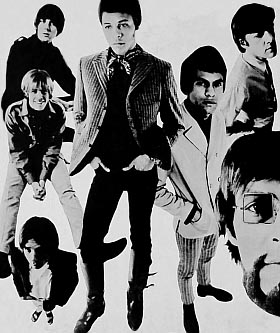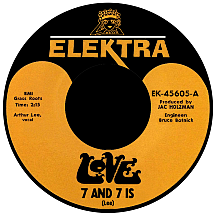LOVE
7 and 7 Is
Arthur Lee walked a fine line between creativity and delusion; you could say he took each to excess, though he may not have consciously chosen the latter. As a teenager in the 1960s, he felt he was going to die very young; this feeling (with no medical issues to back up the hunch) affected his career, as he urgently pushed forward to create something musically worthwhile. The end result was called, simply, Love, a band that achieved marginal commercial success while enjoying a greater level of endorsement from critics who, commensurate with the act's name, loved what they had to offer between 1966 and '69.
In the late 1950s, Lee's family moved from their home in Memphis to Los Angeles. He began shopping songs he'd written to some of the smaller Southern Cal record companies and in 1963, at the age of 18, he formed a group with Johnny Echols, a childhood friend from Memphis. Calling themselves Arthur Lee and the L.A.G.'s (Los Angeles Group) was a not-too-obvious nod to Booker T. and the MG's (Memphis Group), who'd sprung up in their home town around that time and rocketed to popularity with the instrumental "Green Onions." With session musicians on sax and drums, organist Arthur and lead guitarist Johnny recorded "The Ninth Wave" backed with "Rumble-Still-Skins," picked up for distribution by Capitol Records as the surf craze was raging (despite the A side title, both instros are more R&B shaker than surf-rock). The single met with indifference and a year later they recorded "Luci Baines" as The American Four on the Selma label; the Lee-penned song (as were the earlier sides) sounded too similar to "Twist and Shout" to be taken seriously, but the pair stayed with the "Four" moniker for several months, recording one or two unreleased songs before moving on to another project.
Lee crossed paths with Jimi Hendrix, who at one point in early '65 played on a recording of his song "My Diary" by vocalist Rosa Lee Brooks. Shortly afterwards, Arthur and Johnny made a demo under a third band name, the Grass Roots, with other musicians that would soon be part of the Love lineup; "You I'll Be Following" employed a guitar style similar to Jim McGuinn of hot new Los Angeles-based band The Byrds. A different L.A. act calling itself The Grass Roots, led by P.F. Sloan and Steve Barri, sprang up on the Dunhill label and had a hit on local radio (a cover of Bob Dylan's "Ballad of a Thin Man" titled "Mr. Jones"). Confusion had crept in; Lee's bunch set the demo aside and went in a different direction (one little oddity: he kept "Grass Roots" as the name of his publishing company).
Love started out as a five-man outfit with guitarist Bryan Maclean, bassist Ken Forssi and drummer Alban Pfisterer (who insisted on being called "Snoopy") joining Echols and Lee. Early photos of the band show Lee sporting a long, straight wig, obscuring his African-American ethnicity. Whether intentional or not, his musical style could never be pigeonholed based on his background. At heart, Arthur Lee was a rocker. Love gained local fame in the clubs along Hollywood's Sunset Strip; word of mouth grew during their time at a new nightspot, Bido Lito's. Jac Holzman, whose Elektra label primarily focused on folk music, stopped by to check them out. He'd been wanting to test the waters in the potentially lucrative rock market and signed Love as the company's first such act. "My Little Red Book," a Burt Bacharach-Hal David song performed by Manfred Mann in the '65 comedy film What's New Pussycat?, was issued as the first Love single in the spring of '66. Lee's raw vocals gave the song a thicker, edgier sound than the Mann movie version. It was a top ten hit in L.A. but only landed mid-chart on Billboard's Hot 100 in June. It was better than Holzman had expected. The band had gotten off to a solid start.

The 14-song Love debut album came immediately and managed moderate sales levels on par with the single, while critics generally praised the music as something next-level (never mind the retro-by-one-year McGuinn guitar technique evident on several tracks). Then another single, not from the album, appeared three months after "Book," rocking hard in a forceful two minute rush, Lee's vocals spitting out the lyrics ('When I was a boy I thought about the times I'd be a man...I'd sit inside a bottle and pretend that I was in a can!') on the fast track to an atomic bomb explosion sound effect followed by a leisurely-paced electric guitar fade-out in the ninth and final quarter-minute. "7 and 7 Is" became Love's biggest hit as it rose to a number 33 late-summer peak on the Billboard and Cash Box singles charts. The second album, Da Capo, dropped around the end of the year with an expanded roster...seven members including short-stint recruits Tjay Cantrelli, a dual-threat saxophone and flute player, and drummer Michael Stuart (Snoopy, it seems, had been transferred to keyboard duty). The LP sported exactly half as many tracks as the first (side two contained just one overindulgent 19-minute song, "Revelation"). Critics still praised it. As a whole, the album was quite compelling; there was something special about Love.
Holzman was satisfied to the extent of overlooking Lee's many quirks. Wearing sunglasses with one red lens was just a weird fashion choice, but his unwillingness to perform outside Southern California certainly wasn't in the band's best interests. The lack of touring or any further hit singles certainly didn't help raise the act's profile. Impressed by The Doors, who'd begun making their mark in the Hollywood nightclubs, Lee recommended them to Holzman. The Jim Morrison-led group took a much more aggressive approach to seeking stardom and in a short time Elektra had shifted its main focus to the newer rock hopefuls. Nevertheless, Jac gave Arthur free reign to produce a more elaborate album to commemorate his impending, self-predicted departure. Forever Changes would contain, as he called them, "My last words to this life."
During what turned into a lengthy creative process, Elektra released two other singles from Da Capo, "Orange Skies" (penned by Maclean, who contributed greatly to the band's output, particularly the forthcoming project) and Lee's "¡Que Vida!," but these were not embraced by radio. Lee co-produced the new album with engineer Bruce Botnick, eleven songs containing incessantly mystifying lyrics overdubbed with strings and horns, arranged by prolific L.A. session man David Angel and played by seasoned classical musicians; two tracks ("Andmoreagain" and "The Daily Planet") were backed by "Wrecking Crew" musicians Billy Strange on guitar and Hal Blaine on drums. The album's only single, "Alone Again Or" (Mclean wrote it and did the lead vocal), included Spanish-style brass instruments, but didn't get much radio exposure (though like the two '66 discs it made the top ten in Los Angeles). While critically acclaimed as usual, it was not everyone's cup of tea and sold considerably poorer than earlier efforts.
There was a fourth Elektra album in 1969, Four Sail, essentially a solo effort by Lee (or "Arthurly," a new spelling he'd come up with), as the band had fallen apart by that time. "Alone Again Or" had a second life on rock-formatted stations, entering the Billboard chart briefly in the summer of 1970, furthering the cause of Forever Changes as it reached more listeners on its way to "rock classic" status. Arthur recorded under the Love name for Blue Thumb in '69 and '70, made solo recordings for A&M in 1970 and took one more vinyl Love ride in 1974 with an album on RSO. He performed from time to time as Love, with various backing musicians, throughout the coming years. Arthur Lee's end came nearly four decades later than anticipated: in 2006, at age 61.


